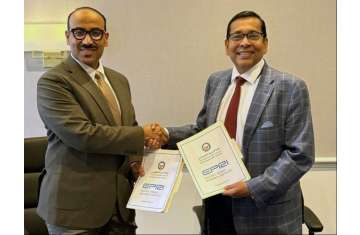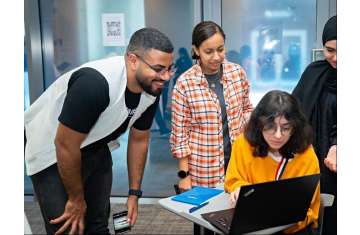Urgent
Etihad Airways finishes 2025 on award high, scooping over 25 international awards
 FNC, Japanese Parliament discuss accelerating cooperation
FNC, Japanese Parliament discuss accelerating cooperation
 UNESCO grants Fujairah membership to its Global Network of Learning Cities
UNESCO grants Fujairah membership to its Global Network of Learning Cities
 Indonesia plans to buy 200 helicopters for defense, disaster response
Indonesia plans to buy 200 helicopters for defense, disaster response
 Strategic collaboration between GCC Interconnection Authority, EPRI
Strategic collaboration between GCC Interconnection Authority, EPRI
 Youth 4 Sustainability concludes Global Mentorship Programme
Youth 4 Sustainability concludes Global Mentorship Programme
 Dubai SME collaborates with Google to empower Emirati businesses
Dubai SME collaborates with Google to empower Emirati businesses
 Dubai Future Labs’ Aysha AlShehhi wins 2025 L’Oreal-UNESCO For Women in Science Award
Dubai Future Labs’ Aysha AlShehhi wins 2025 L’Oreal-UNESCO For Women in Science Award

 FNC, Japanese Parliament discuss accelerating cooperation
FNC, Japanese Parliament discuss accelerating cooperation
 UNESCO grants Fujairah membership to its Global Network of Learning Cities
UNESCO grants Fujairah membership to its Global Network of Learning Cities
 Indonesia plans to buy 200 helicopters for defense, disaster response
Indonesia plans to buy 200 helicopters for defense, disaster response
 Strategic collaboration between GCC Interconnection Authority, EPRI
Strategic collaboration between GCC Interconnection Authority, EPRI
 Youth 4 Sustainability concludes Global Mentorship Programme
Youth 4 Sustainability concludes Global Mentorship Programme
 Dubai SME collaborates with Google to empower Emirati businesses
Dubai SME collaborates with Google to empower Emirati businesses
 Dubai Future Labs’ Aysha AlShehhi wins 2025 L’Oreal-UNESCO For Women in Science Award
Dubai Future Labs’ Aysha AlShehhi wins 2025 L’Oreal-UNESCO For Women in Science Award











Comments